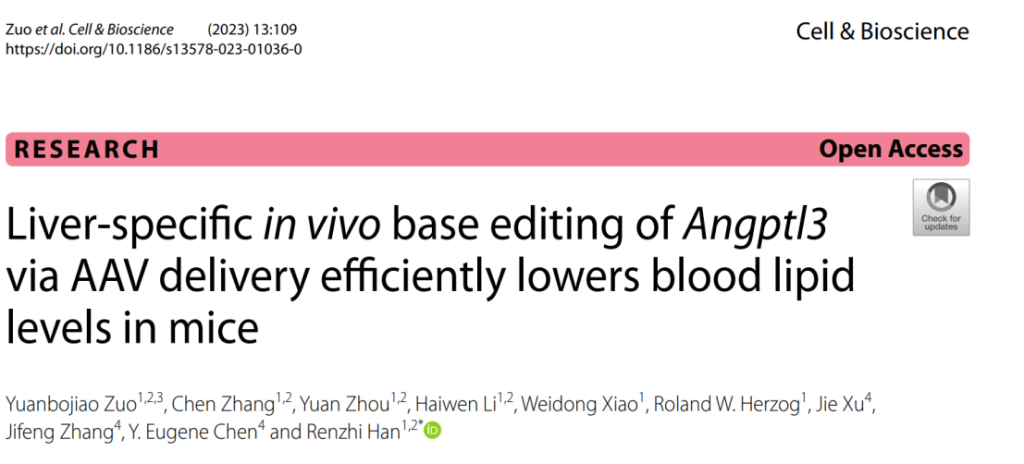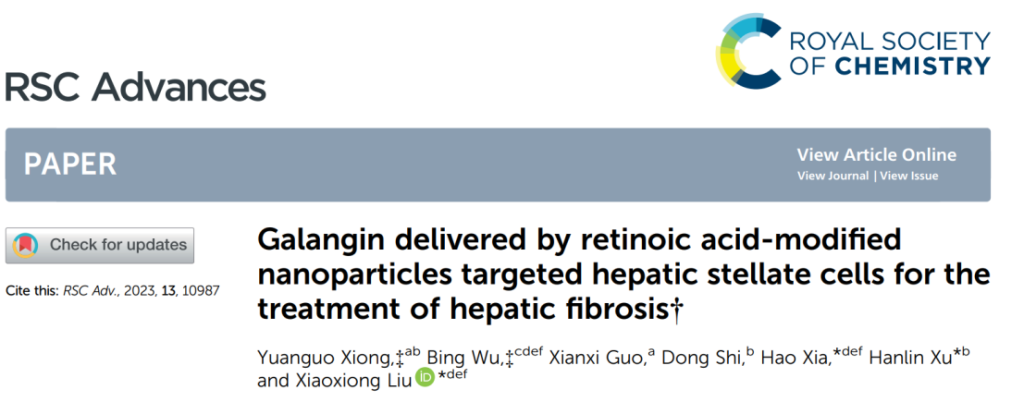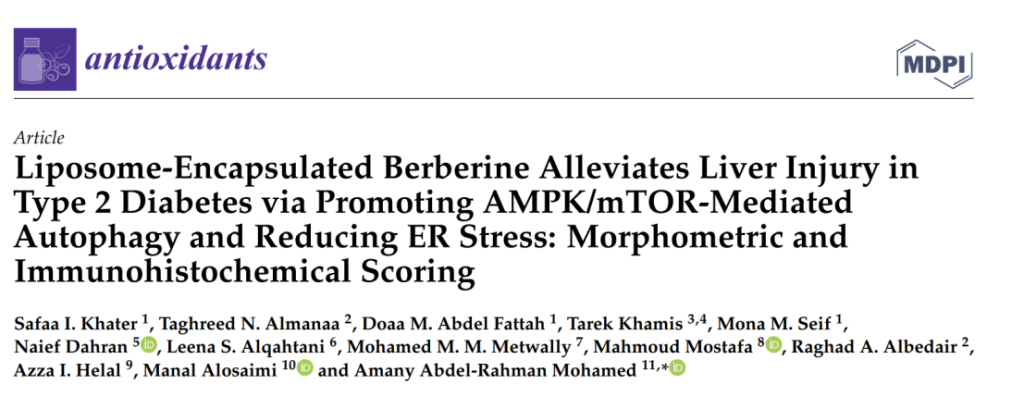Editor: NIna
Introduction:
The liver plays a vital role in maintaining metabolic balance, yet it is highly susceptible to diseases such as fibrosis, metabolic disorders, and cancer, which are exacerbated by rising global rates of obesity and diabetes. Traditional therapies often fall short in addressing the complexity of liver pathology, driving the need for innovative approaches. Recent advancements in gene editing, such as AAV-mediated techniques, and nanotechnology-based drug delivery systems have shown remarkable potential in targeting specific mechanisms underlying liver diseases. These cutting-edge strategies not only improve treatment efficacy and reduce systemic side effects but also pave the way for precision medicine. This review highlights recent breakthroughs in these fields, focusing on their transformative impact on addressing liver-related conditions.

“Liver-Specific In Vivo Base Editing of ANGPTL3 via AAV Delivery Efficiently Lowers Blood Lipid Levels in Mice” by Yuanbojiao Zuo et al., published in Cell & Bioscience (2023), demonstrates the efficacy of a dual adeno-associated virus (AAV) system for hepatocyte-specific targeting of the Angptl3 gene. The research by Zuo et al. provides a foundational understanding of liver-specific gene editing as a long-term therapeutic strategy for lipid-related disorders and cardiovascular health. By introducing a premature stop codon using cytosine base editing, the study achieved an average editing efficiency of 63.3%, leading to reductions of 58% in triglycerides (TG) and 61% in total cholesterol (TC) in mice. This permanent modification, achieved within 4 weeks, highlights the potential of ANGPTL3 base editing as a durable therapeutic approach for cardiovascular diseases associated with hyperlipidemia.

Building on the theme of liver-targeted therapies, Xiong et al. apply a nanoparticle-based delivery system to treat hepatic fibrosis, offering a precise and effective approach for targeting specific liver cells.“Galangin Delivered by Retinoic Acid-Modified Nanoparticles Targeted Hepatic Stellate Cells for the Treatment of Hepatic Fibrosis” by Yuanguo Xiong et al., published in RSC Advances (2023), explores a retinoic acid (RA)-modified nanoparticle system for targeted drug delivery. Galangin-loaded nanoparticles demonstrated high encapsulation efficiency, improved bioavailability, and controlled release. Pharmacodynamic studies showed significant anti-fibrotic effects via inhibition of hepatic stellate cell activation, reducing extracellular matrix accumulation in hepatic fibrosis models, thus presenting a promising anti-fibrosis treatment strategy.

Similarly, Khater et al. explore the role of lipid-based delivery systems in managing liver injury associated with diabetes, highlighting the therapeutic potential of modulating liver-related pathways such as AMPK/mTOR. “Liposome-Encapsulated Berberine Alleviates Liver Injury in Type 2 Diabetes via Promoting AMPK/mTOR-Mediated Autophagy and Reducing ER Stress” by Safaa I. Khater et al., published in Antioxidants (2023), investigates the protective effects of liposome-encapsulated berberine (Lip-BBR) on diabetic liver injury in rats. Lip-BBR restored hepatic architecture, reduced oxidative stress and endoplasmic reticulum (ER) stress, and improved lipid metabolism by activating the AMPK/mTOR pathway. Key findings include significant reductions in liver triglycerides and improvements in autophagy-related markers, offering a potential therapeutic for liver complications in Type 2 diabetes.

Finally, Sun et al. expand these liver-focused delivery innovations to oncology, demonstrating the efficacy of nanoparticle systems for cancer therapy through improved drug delivery and reduced toxicity.“Co-Delivery of EGCG and Melittin with Self-Assembled Fluoro-Nanoparticles for Enhanced Cancer Therapy” by Meiling Sun et al., published in Aging (2023), introduces a fluorinated nanoparticle platform for co-delivery of epigallocatechin gallate (EGCG) and melittin, a peptide derived from bee venom, for hepatocellular carcinoma treatment. The nanoparticles demonstrated significant apoptosis induction via Bax/Bcl-2 regulation, inhibited PD-L1 expression to enhance immune response, and suppressed tumor growth in vivo. This strategy effectively reduced melittin’s toxicity, enhancing delivery and therapeutic outcomes.
Conclusion:
The four studies collectively underscore the transformative potential of advanced delivery systems, natural bioactive compounds, and gene editing in addressing chronic diseases, particularly those involving the liver. The targeted gene editing approach demonstrated by Zuo et al. offers a durable solution for managing hyperlipidemia and cardiovascular disease. Xiong et al. and Khater et al. further emphasize the role of precision drug delivery in treating hepatic fibrosis and diabetic liver injury, respectively, by leveraging nanoparticles and modulating specific cellular pathways. Sun et al. extend this paradigm to cancer therapy, integrating nanoparticles with therapeutic agents to enhance efficacy and reduce toxicity in hepatocellular carcinoma. Together, these findings highlight the critical importance of precision medicine and targeted therapies in maximizing therapeutic efficacy while minimizing systemic toxicity. As these technologies progress, they offer significant promise for translating these innovative approaches into clinical applications, redefining the treatment landscape for liver and other chronic diseases.
Reference:
Khater, Safaa I., et al. “Liposome-encapsulated Berberine alleviates liver injury in type 2 diabetes via promoting AMPK/mTOR-mediated autophagy and reducing ER stress: morphometric and Immunohistochemical scoring.” Antioxidants 12.6 (2023): 1220.
Sun, Meiling, et al. “Co-delivery of EGCG and melittin with self-assembled fluoro-nanoparticles for enhanced cancer therapy.” Aging (Albany NY) 15.11 (2023): 4875.
Xiong, Yuanguo, et al. “Galangin delivered by retinoic acid-modified nanoparticles targeted hepatic stellate cells for the treatment of hepatic fibrosis.” RSC advances 13.16 (2023): 10987-11001.
Zuo, Yuanbojiao, et al. “Liver-specific in vivo base editing of Angptl3 via AAV delivery efficiently lowers blood lipid levels in mice.” Cell & Bioscience 13.1 (2023): 109.
